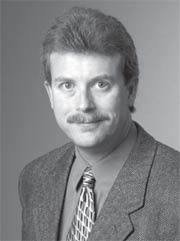Advocacy in action: I’ll get around to it later
 I’ll get around to
it later
I’ll get around to
it laterThe AASV mission statement reads as follows:
“It is the mission of the American Association of Swine Veterinarians to increase the knowledge of swine veterinarians by:
- Promoting the development and availability of the resources which enhance the effectiveness of professional activities
- Creating opportunities which inspire personal and professional growth
- Advocating science-based approaches to industry issues
- Encouraging personal and professional interaction
- Mentoring students, encouraging life-long careers as swine
veterinarians.”
Each of the five issues forming the foundation of our association is important to furthering the professional, personal, or both aspects of our careers as swine veterinarians. Four of the foundation issues are focused internally, and we, as individuals, have a direct effect on their impact. There are many opportunities for you to obtain the resources necessary to enhance your professional capabilities. You create opportunities on a daily basis that further your professional and personal growth. As veterinarians, we tend to seek out personal and professional interaction, and most of us welcome the opportunity to mentor a student or recent graduate. The AASV serves as a resource to provide you with access to these opportunities, but it remains incumbent on you as individuals to take full advantage of them, and taking advantage of them enhances your professional or personal life or both.
Advocacy, however, is an attempt to reach out to the rest of the world and educate them about what we do, how we do it, and why. It is important to reach out to them, because they influence our ability to practice veterinary medicine, care for our animals, and interact with our clients. There are numerous forces, some even within our own profession, which would like to dramatically change your way of life and that of our clients. Unfortunately, it’s often difficult for us as individuals to combat these forces. As an association, however, we can have a greater impact and a louder voice.
Compared with most of the organizations that would like to alter your ability to practice, AASV is still relatively small. We represent 750 US swine veterinarians. That’s only 1% of the veterinarians in the United States. By comparison, the Humane Society of the United States claims to represent 20,000 people in every US congressional district. That’s a lot of votes. You may ask, “How do we compete with that?” The answer is, by getting involved with other groups and associations of like-minded individuals. Forming coalitions makes our voice much louder and gains us access to decision-makers.
Being part of a coalition, however, involves much more than signing our names on a circular letter. We have to become active participants in the process. The “face” of our organization has to become recognizable to regulators, legislators, policy-makers, other coalition members, and, yes, even to our enemies. These folks need to hear your opinion. I visited with senate staffers last year regarding the Horse Slaughter Prevention Act, following its passage in the house by an overwhelming majority. The staffers I spoke with told me that this bill was the number-one issue about which they were receiving e-mails and phone calls – more even than about the war and immigration. And all of the communication they were receiving was in favor of the bill. They indicated that it would be very difficult for a senator to vote against the bill in light of that kind of response, even though they recognized that it was bad legislation. Fortunately, the bill died in the senate, but it will likely be re-introduced during the 110th Congress.
Another obvious challenge to our industry is the push to eliminate gestation stalls as an acceptable method of sow housing. In spite of the fact that science does not indicate that one housing method enhances sow welfare above another, the decision is being made on the basis of emotion and marketing. As veterinarians, we are concerned that the decisions we make are in the best interest of the animals we care for, and we rely on science to guide us. A large number of issues could significantly affect the way you practice your profession. These issues will likely be decided by people who know very little about what you or our clients do. Some issues are local and others are national or even international in scope and involve such topics as antimicrobial access and use, animal welfare, small-business issues (eg, taxes, insurance, OSHA), declining numbers of food-supply veterinarians, lack of funding for independent references (eg, FARAD) and research, drug compounding, food safety, humane slaughter, and accreditation changes, just to name a few.
Our daily lives and careers are very busy. We find time, however, to make sure that we do those things that enhance our professional and personal lives – the other four tenets of our mission. We also need to recognize the value in contributing some time and resources to advocacy as well. You can do this by taking the time to meet your legislator when he or she is in town, send e-mails to your representatives, give presentations to local school kids or civic groups, become active with the National Pork Board or the National Pork Producers Council, participate in AVMA, or even just contribute to political action committees. Most of all, take an interest in these issues and understand that their outcome will have a significant impact on your profession and your ability to choose how you practice it.
— Harry Snelson